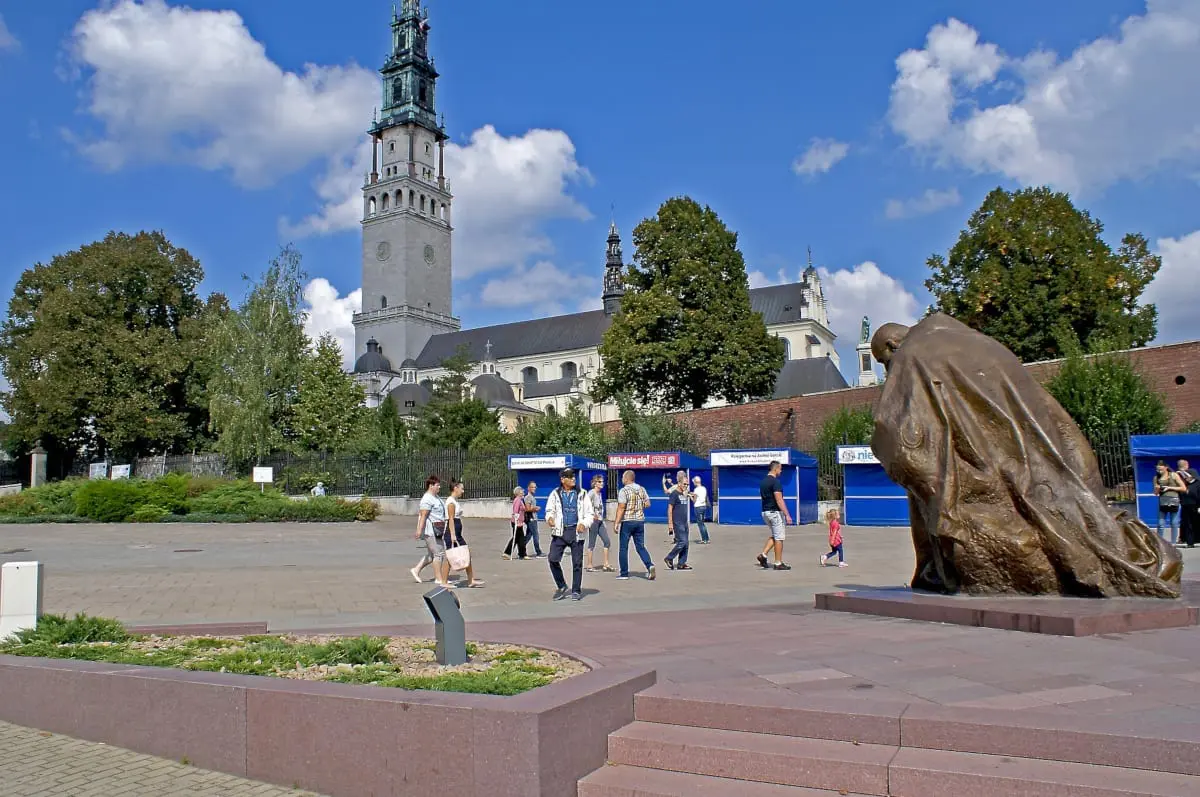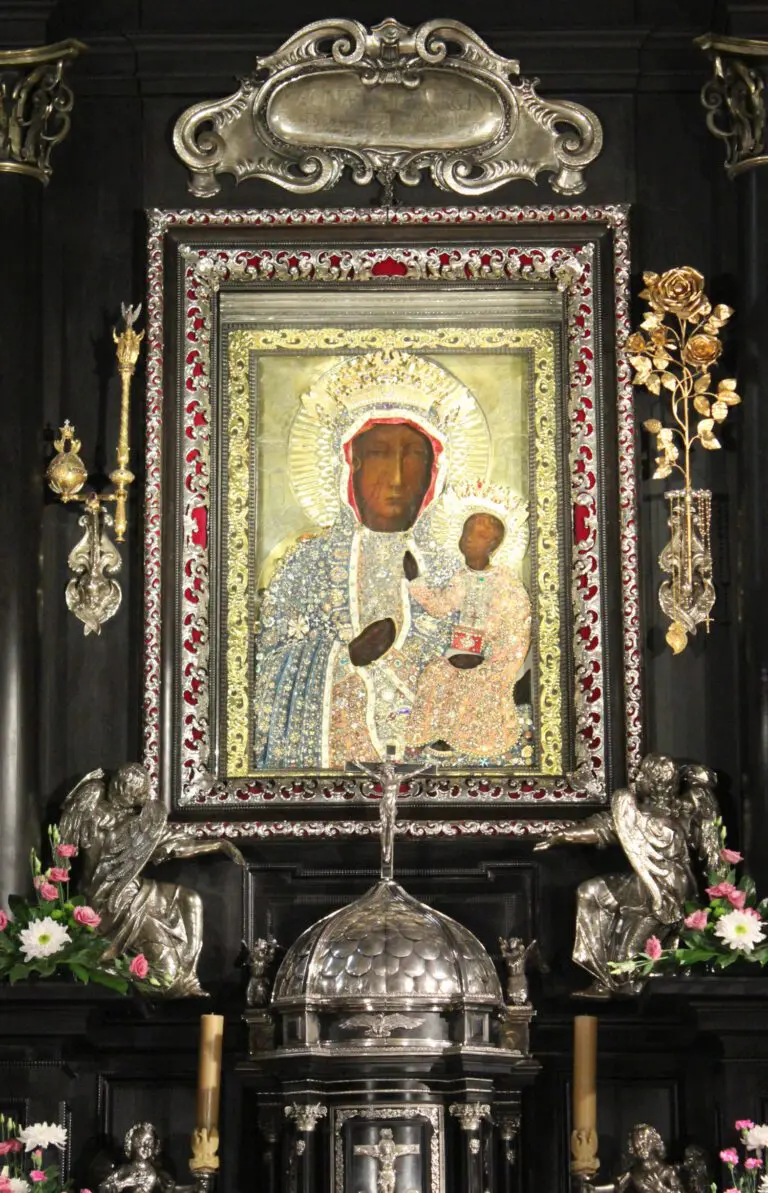
Home of the Black Madonna
Czestochowa is a city in south Poland on the Warta River. It lies among the picturesque Jurassic rocks of Krakow Czestochowa Upland, topped with the ruins of Medieval castles. It is the second-largest city in the Silesian Voivodeship, with a population of over 200,000 people, and has been an important center of pilgrimage for centuries.
One of the main attractions of Częstochowa is the Jasna Góra Monastery, which is the spiritual heart of the city and one of the most important pilgrimage sites in Europe. The monastery is home to the famous Black Madonna painting, a miraculous icon of the Virgin Mary that has been venerated by millions of pilgrims over the centuries. The monastery also houses a museum with a collection of historical artifacts, including religious art, weapons, and armour.

Black Madonna & The Pope
Several Pontiffs have recognised the venerated icon, beginning with Pope Clement XI who issued a Canonical Coronation to the image on 8 September 1717 via the Vatican Chapter. Pope John Paul II, a native son of Poland, prayed before the Madonna in Czestochowa during his historic visit in 1979, several months after his election to the Chair of Peter. The Pope made another visit to Our Lady of Czestochowa in 1983 and again in 1991.
The Black Madonna of Czestochowa is a holy icon of the Virgin Mary, that is both Poland’s holiest relic and one of the country’s national symbols.
Because of the Black Madonna, Czestochowa is regarded as the most popular shrine in Poland, with many Polish Catholics making a pilgrimage there every year. Often, people will line up on the side of the road to hand provisions to the pilgrims as those who walk the distance to Czestochowa walk the entire day and have little means to get things for themselves.
Tourism in Czestochowa
Currently the city is one of the main tourist attractions of the area and is sometimes called the little Nuremberg because of the number of souvenir shops and historical monuments. It attracts millions of tourists and pilgrims every year.
Legends about the Madonna’s appearance
The legend concerning the two scars on the Black Madonna’s right cheek is that the Hussites stormed the Pauline monastery in 1430, plundering the sanctuary. Among the items stolen was the icon. After putting it in their wagon, the Hussites tried to get away but their horses refused to move. They threw the portrait down to the ground and one of the plunderers drew his sword upon the image and inflicted two deep strikes. When the robber tried to inflict a third strike, he fell to the ground and writhed in agony until his death. Despite past attempts to repair these scars, they had difficulty in covering up those slashes as the painting was done with tempera infused with diluted wax.
Arrival in Czestochowa
Art historians say that the original painting was a Byzantine icon created around the sixth or ninth century. They agree that Prince Władysław brought it to the monastery in the 14th century.
Parks & gardens
Aside from the Jasna Góra Monastery, Częstochowa is also known for its beautiful parks and gardens. The most famous of these is the Park of the 600th Anniversary of Częstochowa, which covers over 50 hectares and includes a large pond, walking paths, and a rose garden. Other popular parks include the Silesian Park, which features a large amusement park, and the Częstochowa City Park, which is a great place to relax and enjoy nature.
Museums & monuments
For those interested in history, Częstochowa has several museums and monuments that showcase the city’s rich past. The Muzeum Częstochowskie, for example, is a historical museum that features exhibits on the city’s origins, its role in Polish history, and the lives of its most famous residents. The Archcathedral of St. James is another important historical monument, as it is the oldest church in Częstochowa and has been a center of religious and cultural life for over 500 years.
Arts & culture
Another unique aspect of Częstochowa is its vibrant arts and culture scene. The city is home to several theatres, art galleries, and cultural centres, such as the Teatr im. Adama Mickiewicza, which is the oldest theatre in Silesia, and the Galeria Sztuki Współczesnej, which showcases contemporary art from Poland and around the world. The annual Częstochowa Jazz Festival is also a major event on the city’s cultural calendar, drawing jazz musicians and enthusiasts from all over Poland and beyond.
In conclusion, Częstochowa is a city that offers something for everyone. Whether you are interested in history, religion, nature, or culture, you will find plenty to see and do here. With its friendly people, beautiful scenery, and rich cultural heritage, Częstochowa is a must-see destination for anyone traveling to Poland.
For further information about religious destinations and tourism in Poland, please visit our travel partner, the Poland Travel Agency.
Black Madonna Tours